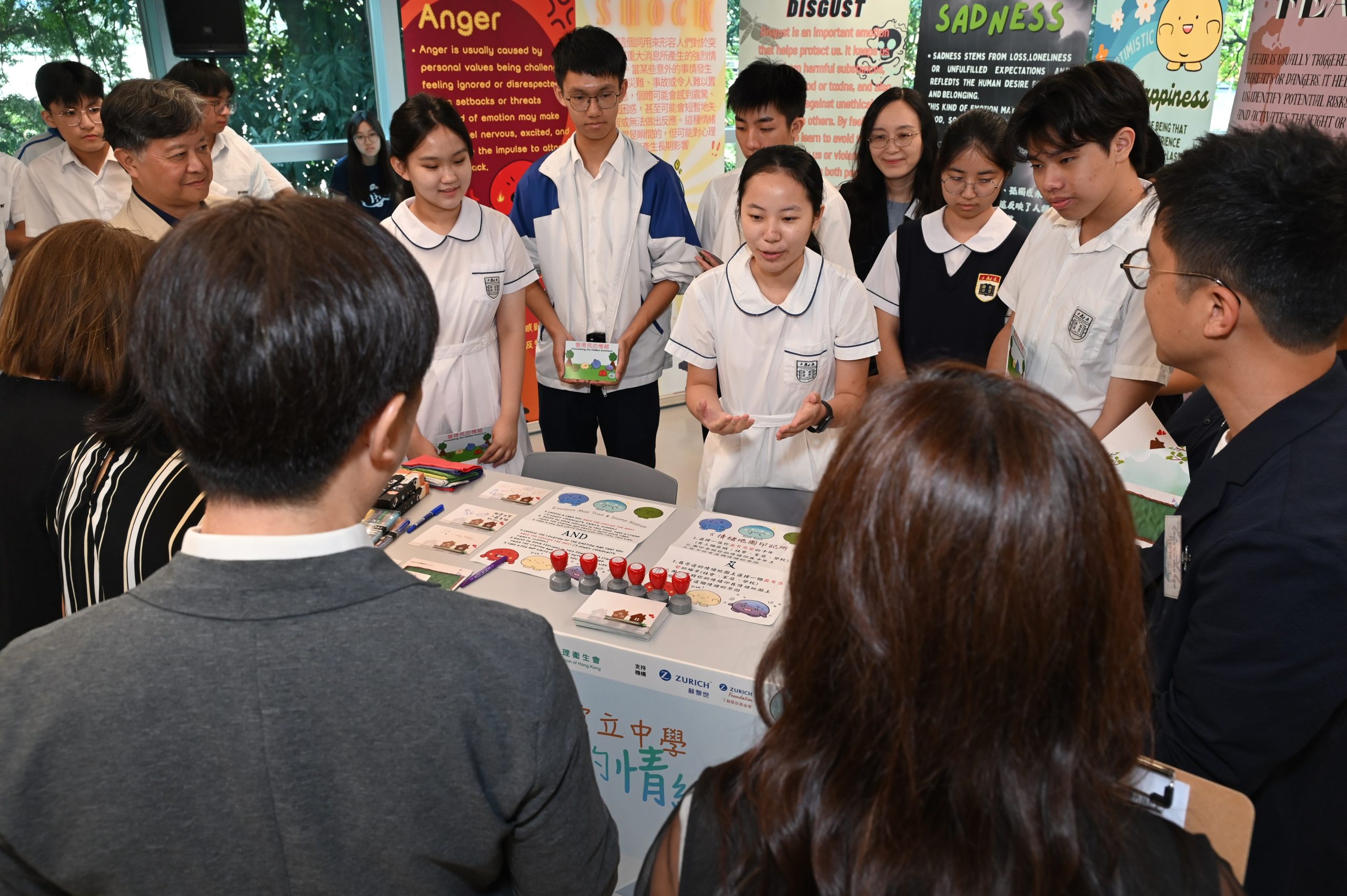HONG KONG – Since 2023, Zurich Insurance (Hong Kong) (“Zurich Hong Kong”) has started collaborating with Z Zurich Foundation and The Mental Health Association of Hong Kong (“MHAHK”) to launch Chill Lab, a youth mental wellbeing prevention and promotion program that aims to drive systemic change in Hong Kong’s approach to youth mental wellbeing. Since then, Chill Lab has become the flagship youth mental wellbeing initiative of MHAHK.
Tulsi Naidu, CEO Asia Pacific, Zurich Insurance (right three), Eric Hui, CEO, Zurich Insurance (Greater China) (left four), and Sofyen Khalfaoui, Head of Improving Mental Wellbeing, Z Zurich Foundation (right two), visited the Chill Lab’s youth hub with and Stephen Wong, Deputy Director, MHAHK (left three).
Over the past two years, Chill Lab has positively impacted 146,161 lives, by engaging 187 secondary schools —covering more than 30% of Hong Kong’s secondary schools. The program engaged youths via innovative activities such as AR/VR experiential sessions, creative art workshops, social media campaigns and large-scale community events. Capacity-building initiatives were organized to train 200 youth ambassadors, teachers, and parents, who further reached 4,620 people through school and community activities.
The program’s innovation and impact have been recognized with the Platinum Award for Excellence in Health & Mental Health at the “Champions for Good Awards 2025” and the Excellence in Innovation Award from the Dr. Lo Wai Hoi Memorial Fund.
Eric Hui, Chief Executive Officer of Zurich Insurance (Greater China), said, “Chill Lab demonstrates the power of prevention, creativity and youth leadership in strengthening mental resilience across Hong Kong. We are proud to support this program alongside the Z Zurich Foundation and to see the measurable difference it has made. Our support is driven by a belief that promotion and prevention activities, and youth leadership can help build a healthier future for the next generation that aligns perfectly well with our brand purpose of creating a brighter future together.”
Over the past two years, Chill Lab has positively impacted 146,161 lives, by engaging 187 secondary schools.
The “We Can – Youth Pioneer Program” emerged as Chill Lab’s signature youth-led success this year. The program trained 40 secondary students from five schools in project design, public engagement and advocacy. Equipped with practical skills and mentorship, these young leaders designed and delivered 17 projects across schools and communities, directly benefiting 17,005 members of the public. Activities ranged from interactive booths and peer support campaigns to creative workshops encouraging emotional expression and empathy.
Post-program evaluation showed strong gains among participants: problem-solving (“always considering multiple solutions”) increased from 60% to 93%, and over 95% reported greater willingness to care for their own and others’ mental health. School leaders praised the program’s practical training and student ownership while students described increased empathy, improved listening skills and a deeper understanding that emotional wellbeing is a life skill for everyone. The program culminated in an award ceremony during the summer holidays that celebrated outstanding proposals, creativity and impact across participating schools.
Mr. Stephen Wong, Deputy Director, MHAHK, added, “Students are the future pillars of our society, and their creativity drives meaningful change. We are proud to launch ‘We Can’ as a model that empowers young people to lead mental health initiatives in their schools and communities. We hope more schools will adopt this youth-led approach and help create mental health friendly campuses across Hong Kong. We are also grateful to have mentors and judge from Zurich Hong Kong who provided valuable advice to the students”
The “We Can” program culminated in an award ceremony during the summer holidays that celebrated outstanding proposals, creativity and impact across participating schools.
Recently, the Z Zurich Foundation has released a compelling white paper “Youth mental wellbeing in Asia-Pacific Region”, highlighting the critical need to support the mental health of young people across the Asia-Pacific (APAC) region. The report reveals that youth mental wellbeing is at risk, with 50% of mental health conditions beginning by age 14. The insights underscore the critical need to support the mental health of young people in APAC and underscore the urgency of upstream, community-based and school-centered interventions. The white paper points to the central role of schools as platforms for prevention and destigmatisation, and the effectiveness of youth-led and interactive programs in raising engagement and help seeking. Chill Lab’s focus on AR/VR experiential learning, peer support and youth leadership align directly with these findings and demonstrates how prevention oriented, school-based models can build resilience, life skills and connectedness.
Gregory Renand, Head of the Z Zurich Foundation, stated, “Chill Lab exemplifies the preventive, youth centric approach our white paper recommends. The program’s use of schools as a platform, its interactive AR/VR learning and, importantly, its youth led ‘We Can’ model align directly with the white paper’s call to build resilience, life skills and peer support. These are essential levers to reduce stigma and improve access to timely care for young people.”
Chill Lab is committed to driving systematic change towards youth mental health by fostering long-term partnerships across education, community, private and public sectors. Entering its third year, Chill Lab will refine its interventions based on evaluation insights and strengthen collaborations with schools, teachers and community partners. Planned developments include integrating AI into AR/VR games to enhance engagement and personalized learning, expanding interactive exhibitions, and embedding youth led initiatives more deeply within the education system. These efforts aim to sustain long-term improvements in youth mental health literacy, resilience and help seeking behaviors across Hong Kong.
